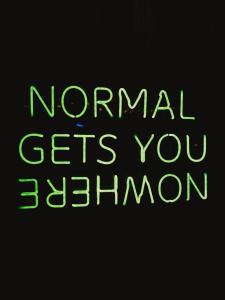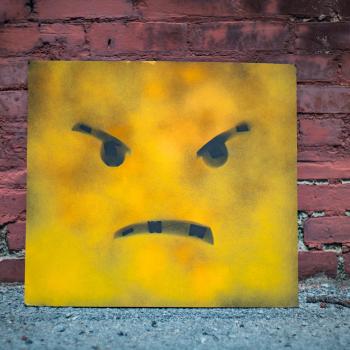
I don’t like Normal. That’s not a surprise. Over the past two weeks I have been journaling to understand the source of my slightly oppositional nature. I guess that’s good, therapy’s got me reflecting. I think it arose out of my antipathy toward my own “normal.” It was defined by others. As the youngest child, the normal in our household was kind of defined before I even arrived. The normal I received may have been tweaked by me, it may have made space for me, but largely it was I that needed to adapt to it.
Don’t get me wrong. I had a good childhood in a loving family. But, nonetheless, I am a contrarian.
Normal Doesn’t Have to Adapt
We have to squeeze into the spaces normal draws for us. Normal doesn’t adapt to us, we must adapt to it. Or we can change it. But if that seems too hard, we can just tell ourselves a fable about the past that gave rise to Normal. Normal doesn’t have to adapt, because we are willing to memorialize the past atrocities. Socially, psychologically, this is an odd dynamic. Rather than take a painful look at how we have been formed by some subtle (or not so subtle) injustice, we just deny the injustice outright.
Build Monuments to the Atrocity
My wife was telling me about the motivations for the secession of the southern states which led to the American Civil War. The fifth-grade textbook she has to teach from states two reasons the south was seeking independence. One reason was states’ rights. Another reason stated was to “protect the southern way of life.” My wife is quick to tell me what she may not be allowed to tell her students, that “the southern way of life,” is just code for the enslavement and torture of human beings for profit. In this present era in which truth telling in history has been excessively land-mined, we can simply deny “normal” and just call it something else less offensive.
In, Bias in History Textbooks, American University, the writers note the “According to a Southern Poverty Law Center report, only 8 percent of high school seniors surveyed knew that slavery was the central cause.” Furthermore,
“As recently as 2018, a Texas school assigned Prentice Hall Classics: A History of the United States, which posits that “many [slaves] may not have even been terribly unhappy with their lot, for they knew no other.” Another College Board–approved textbook that “meet(s) the curricular requirements of AP U.S. History” includes a map that refers to forcibly imported Africans in 1775 as “immigrants.”
Nostalgia and Normal
Preaching through the New Revised Lectionary, Year C is giving the opportunity to go back through the Gospel of Luke with a new awareness. The wonder of the scriptures is the ability of the Holy Spirit to continue to speak new life into the ancient words. I see things due to the way the world has changed since the last time I preached through Luke. I’m not the same. My community isn’t the same. The world is not the same. And it’s no surprise that Luke isn’t the same either. The Holy Spirit keeps making it new.
Luke brings up this skewing of memory, where a set of horrible past actions are viewed in a way to make them more palatable. Just whitewash the history. Recast the outcome. It seems the lawyers Jesus was talking to had never heard the saying, “you can’t put a shine on sh*t.” But hey, they tried.
Woe to you! For you build the tombs of the prophets whom your ancestors killed. So you are witnesses and approve of the deeds of your ancestors; for they killed them, and you build their tombs. (Luke 11.47-48).
Matthew’s version makes the statement more pointed:
‘Woe to you, scribes and Pharisees, hypocrites! For you build the tombs of the prophets and decorate the graves of the righteous, (Matthew 23.29)
Matthew goes on to implicate the scribes and Pharisees who try to distance themselves from the past. But without undoing its excesses, they are simply trying to evade the consequences.
Past is Not Prolog
Or, even more, the past is a mandate. Normal carries an unrepentant perspective over the past. Certainly, there are great and beautiful things in the past. But when Normal becomes a form selective memory and denial, Normal prolongs the problems. Somehow, I have regularly cast my contrarian nature into a testimony of hope. Nostalgia can be relentless in its proclamation that it was better in the past. Nostalgia is not just fond memories and gratitude for past events, persons, relationships, and experiences. Nostalgia can pollute our gratitude into an oppressive demand to replay, to repeat, to idolize and make obeisance to what was. That is hopelessness.
Deal with the past without feeling the requirement to put a shine on it. Finding gratitude in delights and trials, the future can remain hopeful. The constrictive demands of Normal is not hope. Maybe hope is not normal (at least not in what’s been Normal), and that’s ok.
Want Craig to come speak at your church, provide a workshop or a retreat? Send an invitation HERE
For more resources from Craig, check out The Missionplace.
Subscribe to The All That’s Holy: Blue Collar Podcast available on iTunes.
Follow me and support me on my Patreon page.












